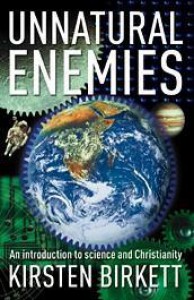A moderate exploration of science and religion

I've noticed that a number of people are lodging some complaints in regards to Goodreads censoring some commentaries in which the review comments on the author as opposed to the book itself. This sort of baffles me because unless the concept of the death of the author has reached a point where the author of the book does not matter, then I cannot see how one can comment on a book without reference to the author. I know I have done this numerous times, and will continue to do so. Obviously if I discover that some of my reviews are disappearing (particularly if I am not told that it has been removed) then I guess I will be looking for another site on which I can comment on books.
Enough said about that because I would rather discuss this book, and of course, the author. Kirsten Birkett is one of the Sydney Anglicans, a group of theologians that have trained at Moore Theological College in Sydney. The Sydney Anglicans have quite a lot of clout in the evangelical circles in Australia, and they have also produced a lot of books that tend to be sold through related churches. These books are not necessarily bad, but they do tend to follow a political line which tends to make me uncomfortable.
This book is basically the Sydney Anglican's stance on science, and it is written generally for younger people. As I have mentioned, the Sydney Anglicans produce an awful lot of books, and the level of the writing goes from being rather easy to follow to very deep and complex. This book falls into the first category.
Fortunately, this is not one of those books that you would expect from the far right fundamentalists, which try to argue that the bible is a scientific text book and that unless we accept the bible literally then we are bound to go to hell. However, this is a Christian book with Christian themes and tries to look at science from a moderate Christian view point. Needless to say though this book still tries to drag science back into the Christian sphere, and in the end seems to be an argument against Atheism.
My Dad, who is a Christian, and a scientist, simply does not get involved in such discussions, and sees no need to fill his mind with books like this. He has never seen a conflict between science and spirituality, and simply says that science is trying to understand the workings of God's world. Further, he does not see a need to attempt to scientifically explain creation or events like Noah's flood, or even try to adjust what the bible says to make the story more plausible. He simply believes and accepts, and then goes on to working on his computer and building his devices. Mind you, this book doesn't do that either, but simply argues as how science and Christianity are not necessarily enemies, but rather two different fields that do not necessarily intersect.


